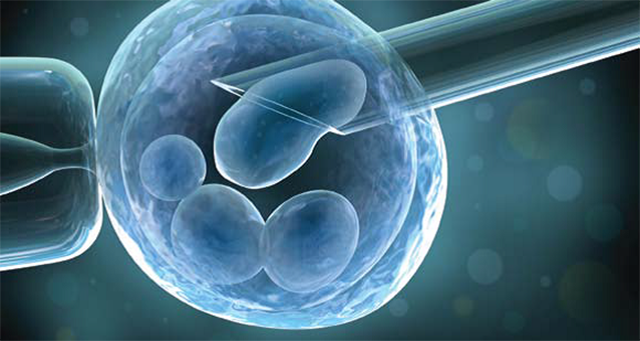
When Prof. Nava Dekel of the Weizmann Institute of Science’s Department of Biological Regulation began studying a protein that plays a role in implanting fertilized eggs in the uterus, she had no idea it would lead to a discovery that is now helping couples struggling with infertility to have children.
For many years, Prof. Dekel focused her investigations on the mechanisms responsible for ovum (egg) development and embryo implantation. “But in science,” she says, “you can never decide ‘this is what I’m going to study for the rest of my life.’ You follow a path, and somewhere along the way you say, ‘Wow – there’s something interesting!’”
In her case, a fortunate detour occurred while she was collaborating with physicians from the In Vitro Fertilization (IVF) Unit of the Kaplan Medical Center in Rehovot on a study of connexin43, a protein that is involved in communication between cells and in the process of embryo implantation. In the late 1990s, the researchers performed an endometrial biopsy – a procedure in which a small sample is taken from the lining of the uterus – on 12 women who had failed to conceive after numerous IVF treatments.
"The hormones related to reproduction are, for me, one of the most attractive and exciting topics in science. And that's because...you're dealing with the beginning of new life."
“To our enormous surprise, we soon learned that 11 of these patients conceived during their next cycle of IVF,” says Prof. Dekel. However, there was a slim chance that the pregnancies were a happy coincidence, or related to something else, and so the scientists set out to repeat the results. In 2003, they conducted a larger study with patients who’d had at least four failed IVF treatments, and discovered that there was no mere coincidence: undergoing an endometrial biopsy prior to IVF treatment actually doubled the chances of a successful pregnancy.
Since then, Prof. Dekel and her colleagues have been investigating the biochemical and molecular events that occur in response to an endometrial biopsy. Their observations indicate that because the biopsy causes a slight injury to the membrane lining the uterus, an inflammation-like reaction occurs, and when immune cells are recruited to the site of the injury to repair the damage, they influence the uterus to produce proteins that facilitate embryo implantation. Prof. Dekel’s team is conducting a human clinical trial to identify hitherto unavailable biomarkers for implantation competence.

Prof. Nava Dekel
“Once we understand the events that take place in response to the injury, we can use this information to develop novel means to increase uterine receptivity,” says Prof. Dekel. It might also be possible, she adds, to analyze patients for certain markers and determine whether they have a low chance of successful implantation, and thus should consider pursuing options other than IVF.
In the meantime, a number of fertility clinics around the world are offering the biopsy procedure to patients undergoing IVF treatment. Prof. Dekel hopes to team up with several IVF centers on a large study and establish a single protocol for the biopsy treatment based on the results. If IVF clinics can achieve a higher rate of successful pregnancies using the biopsy treatment, she hopes that they may more often opt to transfer a single embryo to a patient’s uterus, rather than two or more embryos, and thus avoid the risks associated with multiple-birth pregnancies, such as low birth weight and preterm delivery.
"I have a drawer full of e-mails sent to me by infertile couples from all over the world."
People who hear about the biopsy procedure often reach out to Prof. Dekel in order to learn more. “I have a drawer full of e-mails sent to me by infertile couples from all over the world – from Canada, the U.S., even Brazil, Russia, and China,” she says. One such couple, Howard and Roslyn Kaman of Toronto, had tried unsuccessfully for almost a decade to get pregnant when they read an article about Prof. Dekel in 2007. They contacted her, and she passed along their request to her colleagues at the Kaplan Medical Center, who provided the Kamans with a detailed description of the procedure. Their physician in Toronto used these instructions to perform the biopsy treatment, and “in October of 2008, they had a baby girl named Hannah, and they shared this very exciting and touching news with me,” says Prof. Dekel.
Prof. Dekel is now working with other scientists at the Weizmann Institute to answer some fundamental questions about reproduction. For example, collaborating with Dr. Alon Chen of the Department of Neurobiology, she is studying whether stress has an impact on fertility. Together they’re investigating the role of an important stress-response hormone, the corticotrophin releasing factor (CRF), within the reproductive system.
The researchers found that undergoing an endometrial biopsy prior to IVF treatement doubled a patient's chances of becoming pregnant.
These ongoing studies are part of an interest in reproductive biology that developed when Prof. Dekel was pursuing her master’s degree. “I found out that the hormones related to reproduction are, for me, one of the most attractive and exciting topics in science,” she says. “And that’s because, in this field, you’re dealing with the beginning of new life.”
Prof. Nava Dekel's research is supported by the M.D. Moross Institute for Cancer Research; the Jeanne and Joseph Nissim Foundation for Life Sciences Research; the Yeda-Sela Center for Basic Research; the Willner Family Center for Vascular Biology (which she heads); the Dwek Family Biomedical Research Fund; the Phyllis and Joseph Gurwin Fund for Scientific Advancement; and the J&R Foundation.Prof. Dekel is the incumbent of the Philip M. Klutznick Professorial Chair of Developmental Biology.
